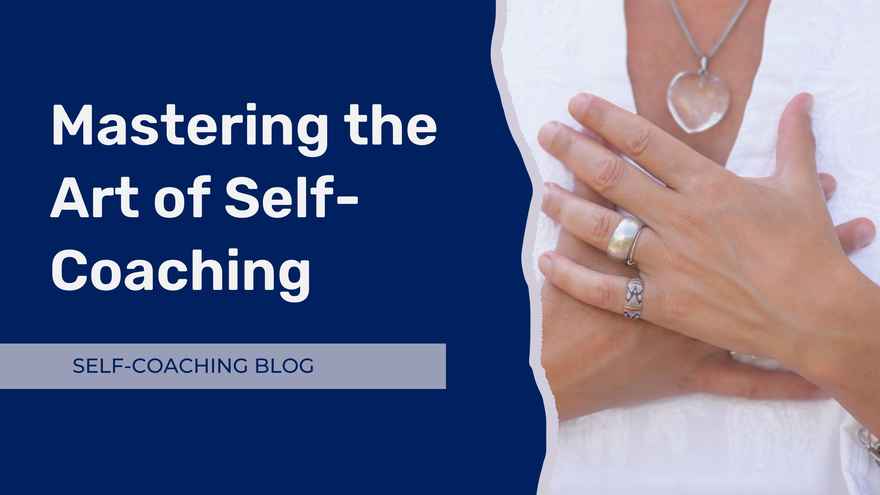Mastering the Art of Self-Coaching: A Key to Unlocking Your Full Potential

In human history, we stand at a juncture of unparalleled privilege and opportunity. With all its advancements and conveniences, the modern world affords us possibilities that past generations could scarcely imagine. Amid this abundance, self-coaching is a crucial skill that emerges as both a necessity and a transformative tool for personal growth so that we can navigate and take advantage of the opportunities available to us.
The Power of Self-Coaching
Self-coaching is more than a buzzword; it's a profound practice that impacts every area of our lives. The internal dialogue guides us through challenges, helps us navigate our emotions, and aligns our actions with our deepest values.
When harnessed effectively, this skill influences how we listen, respond to feedback, and approach life's inevitable adversities.
At its core, self-coaching is about intentional living. It's a purposeful engagement with our inner world aimed at steering ourselves toward our highest potential. Whether dealing with professional hurdles, personal dilemmas, or the daily grind, self-coaching equips us with the tools to face these challenges with resilience and grace.
Privilege and Opportunity in the Modern World
The sheer volume of resources, from information and education to technology and connectivity, places us among the most fortunate humans ever. However, with this privilege comes responsibility: the responsibility to use these advantages wisely, to carve out lives of meaning and fulfilment.
This is where self-coaching becomes indispensable. It allows us to sift through the noise, focus on what truly matters, and leverage our resources to serve our goals. By cultivating a strong self-coaching practice, we can ensure that we're not merely survivors in this age of abundance but active participants, crafting lives that reflect our deepest aspirations.
Maximizing Privilege Through Self-Coaching
The journey of self-coaching begins with awareness. It's about recognizing the inner voice that guides our decisions and learning to shape that voice into a force for good. This process involves critical reflection, honest self-assessment, and a commitment to personal evolution.
One of the first steps in this journey is acknowledging the privilege of our position. When we understand the vast array of options, we can direct our efforts more strategically. Self-coaching helps us to identify our values, set meaningful goals, and align our actions with our beliefs. In doing so, we honour the opportunities we've been given and pave the way for a life of impact and satisfaction.
The Transformative Impact of Self-Coaching
The benefits of self-coaching are as diverse as they are profound. This practice enhances our emotional intelligence, sharpens our decision-making skills, and deepens our relationships. We become more adept listeners, more receptive to feedback, and more courageous in the face of fear. Moreover, self-coaching fosters a sense of self-compassion and understanding, allowing us to navigate the complexities of life with a grounded sense of confidence.
Perhaps most importantly, self-coaching activates our potential. It pushes us to explore the edges of our comfort zones, embrace challenges as a catalyst for growth, and approach life with a sense of curiosity and adventure. By committing to self-coaching, we open ourselves to continuous learning and self-discovery.
Embracing the Practice of Self-Coaching
In a world of possibilities, mastering the art of self-coaching is more than a skill - it's a necessity. It's the key to unlocking our full potential, transforming our lives from the inside out, and making the most of the incredible opportunities surrounding us. As we step into the practice of self-coaching, we embark on a transformative journey that promises personal growth and a life lived to its fullest, richest potential.
In embracing self-coaching, we don't just navigate the world more effectively; we become the architects of our destiny, crafting lives that resonate with purpose, meaning, and joy.
Here's a small step you can take to start your self-coaching journey:
Reflect and Record:
For one week, dedicate a few minutes each day to reflect on your thoughts and emotions. Use a journal to record instances where you felt confident and cases in which you doubted yourself. Next to each entry, write down what you believe triggered these feelings. This exercise aims to increase your awareness of your internal dialogue and the situations that impact your self-coaching voice.
Follow-Up Step:
Identify one recurring negative thought from your journal. Each time this thought surfaces, challenge it with a positive counter-statement. For example, if you often think, "I'm not good enough to handle this," counter it with, "I have faced similar challenges before and succeeded. I have the skills and resources to handle this."

0 comments
Leave a comment
Please log in or register to post a comment